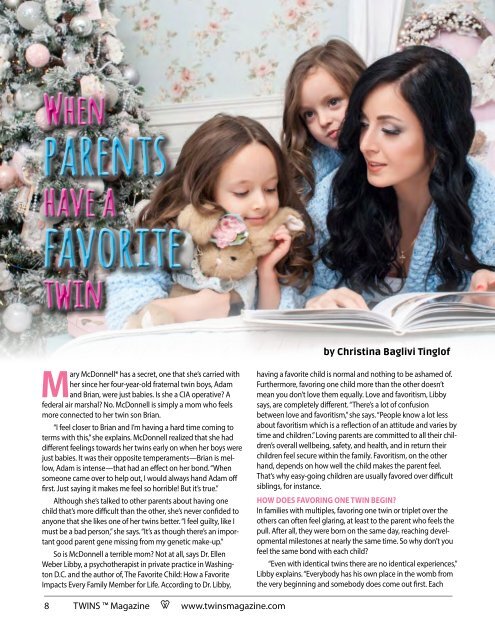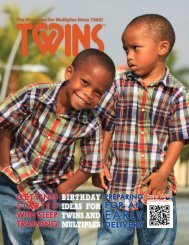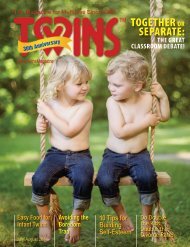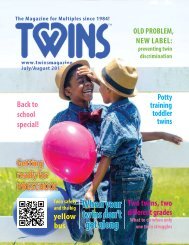2017 HOLIDAY
You also want an ePaper? Increase the reach of your titles
YUMPU automatically turns print PDFs into web optimized ePapers that Google loves.
When<br />
parents<br />
have a<br />
favorite<br />
twin<br />
by Christina Baglivi Tinglof<br />
Mary McDonnell* has a secret, one that she’s carried with<br />
her since her four-year-old fraternal twin boys, Adam<br />
and Brian, were just babies. Is she a CIA operative? A<br />
federal air marshal? No. McDonnell is simply a mom who feels<br />
more connected to her twin son Brian.<br />
“I feel closer to Brian and I’m having a hard time coming to<br />
terms with this,” she explains. McDonnell realized that she had<br />
different feelings towards her twins early on when her boys were<br />
just babies. It was their opposite temperaments—Brian is mellow,<br />
Adam is intense—that had an effect on her bond. “When<br />
someone came over to help out, I would always hand Adam off<br />
first. Just saying it makes me feel so horrible! But it’s true.”<br />
Although she’s talked to other parents about having one<br />
child that’s more difficult than the other, she’s never confided to<br />
anyone that she likes one of her twins better. “I feel guilty, like I<br />
must be a bad person,” she says. “It’s as though there’s an important<br />
good parent gene missing from my genetic make-up.”<br />
So is McDonnell a terrible mom? Not at all, says Dr. Ellen<br />
Weber Libby, a psychotherapist in private practice in Washington<br />
D.C. and the author of, The Favorite Child: How a Favorite<br />
Impacts Every Family Member for Life. According to Dr. Libby,<br />
having a favorite child is normal and nothing to be ashamed of.<br />
Furthermore, favoring one child more than the other doesn’t<br />
mean you don’t love them equally. Love and favoritism, Libby<br />
says, are completely different. “There’s a lot of confusion<br />
between love and favoritism,” she says. “People know a lot less<br />
about favoritism which is a reflection of an attitude and varies by<br />
time and children.” Loving parents are committed to all their children’s<br />
overall wellbeing, safety, and health, and in return their<br />
children feel secure within the family. Favoritism, on the other<br />
hand, depends on how well the child makes the parent feel.<br />
That’s why easy-going children are usually favored over difficult<br />
siblings, for instance.<br />
hoW doeS faVoriNG oNe tWiN beGiN?<br />
In families with multiples, favoring one twin or triplet over the<br />
others can often feel glaring, at least to the parent who feels the<br />
pull. After all, they were born on the same day, reaching developmental<br />
milestones at nearly the same time. So why don’t you<br />
feel the same bond with each child?<br />
“Even with identical twins there are no identical experiences,”<br />
Libby explains. “Everybody has his own place in the womb from<br />
the very beginning and somebody does come out first. Each<br />
8 TWINS Magazine A www.twinsmagazine.com

















